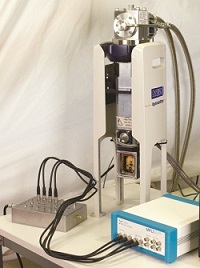Oxford Instruments (OI), market leader in cryogenic equipment, and Zurich Instruments (ZI), the technical leader for digital lock-in amplifiers, announce today their joint technical collaboration primarily focused on demonstrating how the efficiency of combining equipment from both companies results in reduced time between installation and measurement.

The collaboration will yield a series of joint application notes featuring low temperature measurement techniques and applications.
The two companies will also exchange technical expertise in order to improve their customer support for the low temperature community.
Both companies are devoted to the objective of managing the increasing complexity and costs of low temperature research.
The first application note resulting from this collaboration has already been released. The publication relates to the characterization of a high temperature superconducting sample using the MFLI Lock-in Amplifier and the OptistatDry cryostat.
This collaboration continues to demonstrate the versatility of Oxford Instruments’ OptistatDry Cryofree® cryostat for optical and electrical applications. Our customers' demands for streamlined experiments and the joint demonstrations with ZI equipment provide the evidence for faster and more accurate measurements taken in less time.
The OptistatDry comprises a range of compact cryostats with outstanding optical access, fast set-up and fast sample change, cooled by a closed cycle refrigerator.
Dr Michael Cuthbert - Managing Director, Oxford Instruments Nanoscience
Our lock-in amplifiers are designed for efficient and effective measurements. The high-end features and usability that we have developed for our instruments are now, with the MFLI lock-in amplifiers, available for low and medium frequencies.
Covering the frequency range between DC and 500 kHz or, alternatively, up to 5 MHz, the MFLI ideally targets low temperature communities providing signal generation and measurement analysis all within its LabOne© software environment, resulting in an improved understanding of the signal quality during the course of their measurements.
Sadik Hafizovic - CEO, Zurich Instruments
Download the document from the ZI website and from the OI site.